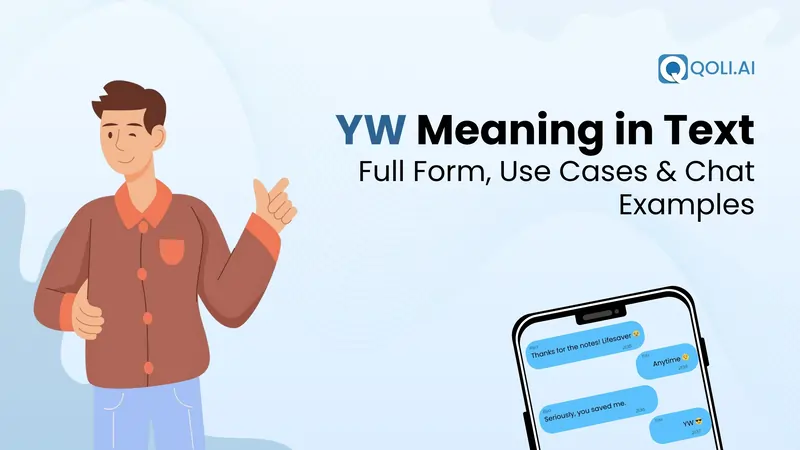YW Meaning in Text: Full Form, Use Cases & Chat Examples
YW is a common message abbreviation teens use in chats. It means “You’re Welcome,” but there’s more to decode. Learn its full meaning in text messages.
Author: Asif Shaik
YW is a common message abbreviation teens use in chats. It means “You’re Welcome,” but there’s more to decode. Learn its full meaning in text messages.
Author: Asif Shaik

So you keep seeing "YW" everywhere, and you're like... what does that even mean? Yeah, I get it. There’s so much texting slang floating around these days that it can honestly feel impossible to keep up with all of it. I’ve got you covered on this one.
YW stands for "You're Welcome."
YW is an abbreviation people use in quick replies commonly used after someone says thank you, especially in text messages, DMs, or online chats. It’s one of those short forms that skips the formal tone but still gets the message across in a harmless way. Instead of typing out a full "You're welcome," people often just go with yw. It’s faster, still polite, and sounds friendly.
People started using this acronym because typing "you're welcome" every single time gets old real quick.
In texting, people rarely write in full sentences. Everything turns into shorthand, not just to save time but to match the tone of a casual conversation.
When someone says “thanks” or “ty" (which stands for “thank you”), a yw is a smooth and simple way to respond. It keeps things low-pressure and friendly.
You might see it like this:
Friend 1: Thanks for the notes.
Friend 2: yw, anytime
It’s not rude, not overly formal, and definitely not cold. It just fits. Think of it like a casual nod in a face-to-face chat.
On social media platforms like Instagram, Snapchat, or X (formerly Twitter), this abbreviation pops up all the time. It’s mostly seen in direct messages, story replies, and comment sections where conversations move quickly.
Let’s say someone compliments your photo or appreciates a post you shared. You reply with “yw,” maybe toss in an emoji to set the tone, and that’s it.
For example:
Follower: Loved your playlist drop today.
You: yw 😌
Using YW is honestly not rocket science, but there are definitely some tricks to not looking weird about it.
You can simply say 'YW' and leave it at that, or you can add a little more warmth:
The main thing is reading the room. If your friend is being super dramatic about thanking you, maybe match that energy instead of just hitting them with a dry "YW."
You're good to use YW when things are chill and casual. Perfect situations:
Example:
You can also adjust your tone by adding emojis.
This popular acronym works best when everyone's on the same page about texting teenage slang.
Sometimes you really should just type out "You're Welcome" like a normal person. Skip the YW when:
In those moments, go for the full “You’re welcome” or try something more thoughtful. “Glad I could help” works when the moment matters.
Tired of saying the same thing every time? You’ve got options. Each one gives off a slightly different energy depending on what you're going for.
Real-life examples:
“thank you for picking that up for me”
“no worries”
“appreciate the help earlier”
“anytime 😇”
These alternatives help you keep things casual while switching up your replies so they don’t feel copy-pasted every time.
There are some weird alternate meanings of YW floating around online, but honestly, 99.9% of the time it just means "You're Welcome." Don't overthink it.
YW might look like another quick-text shortcut, but it does more than save time. It fits into the way people talk online. It matches the tone of fast, friendly, and relaxed chats that don’t need full sentences to be polite.
Once you get the hang of it, using YW feels just right in the moment. And when you want to mix it up, there are plenty of other phrases to keep the conversation fresh.
Once you start using it, it’ll feel normal. It’s just a smooth way to keep things moving in text or chat without making it a big deal.
That’s all you need to know.
Thanks for reading. If this helped you, feel free to pass it on to someone who still types “You’re welcome” every time.